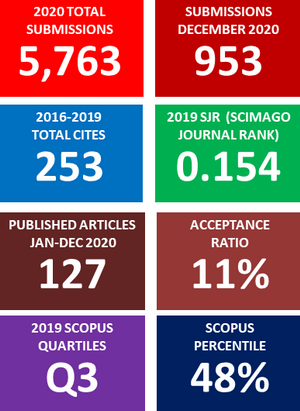Alkyd Printing Inks from Waste Frying Oil
DOI:
https://doi.org/10.48048/wjst.2020.6603Keywords:
Alkyd printing inks, Ink vehicles, Waste frying oil, Sustainable raw materialsAbstract
Alkyd-based printing ink vehicles were successfully prepared from waste frying oil. Three alkyd resins were synthesized using different ratios of phthalic anhydride. Properties of the 3 prepared resins were measured and compared with virgin oil alkyd resin and commercial alkyd resin. Viscosities of the obtained ink vehicles ranged from 8.6 to 34.9 poises. The vehicles were also completely compatible with carbon black for formulating black printing inks. Preliminary properties of the 3 formulated inks were evaluated and compared with black printing ink prepared from virgin oil alkyd and commercial alkyd. The formulated inks had satisfactory viscosity and tackiness as properties suitable for a variety of printing applications. The 3 synthesized inks had rub resistance values ranging from 4.61 to 5.75 %, slightly higher than the rub resistance of virgin oil alkyd ink and commercial alkyd ink. Particle fineness and water tolerance properties of the 3 formulated inks were comparable with virgin oil alkyd ink and commercial alkyd ink. Results suggested that waste frying oil has potential application as a raw material in the printing ink industry.
Downloads
Metrics
References
PP Chiplunkar and AP Pratap. Utilization of sunflower acid oil for synthesis of alkyd Resin. Prog. Org. Coat. 2016; 93, 61-7.
M Alam, D Akram, E Sharmin, F Zafar and S Ahmad. Vegetable oil based eco-friendly coating materials: A review article. Arab. J. Chem. 2014; 7, 469-79.
S Pramanik, K Sagak, BK Konwar and N Karak. Synthesis, characterization and properties of a castor oil modified biodegradable poly(ester amide) resin. Prog. Org. Coat. 2012; 75, 569-78.
BA Kyenge, BA Anhwange, JT Ageh and GO Igbum. Comparative analysis of soybean seed oil modified alkyd resin and epoxidized soybean seed oil modified alkyd resin. Int. J. Modern Org. Chem. 2012; 1, 66-71.
X Zheng, L Yang and K Wang. Synthesis and characterization of alkyd resin based on soybean oil polyols. Adv. Mat. Res. 2011; 239-242, 1721-4.
JU Ezeagba, UJM Ikezu and EO Iloh. Formation of an oil paint using alkyd resin from soybean oil. World Appl. Sci. J. 2014; 32, 83-7.
JS Ling, IA Mohammed, A Ghazali and M Khairuddean. Novel poly(alkyd-urethane)s from vegetable oils: Synthesis and properties. Ind. Crops Prod. 2014; 52, 74-84.
DH Solomon and JJ Hopwood. Molecular weight distribution in alkyd resins part II. Castor oil and hydrogenated castor oil alkyds. J. Appl. Polym. Sci. 1966; 10, 993-1009.
O Saravari and S Praditvatanakit. Preparation and properties of urethane alkyd based on a castor Oil/Jatropha oil mixture. Prog. Org. Coat. 2013; 76, 698-704.
DH Solomon and JD Swift. The influence of catalysts on the glycerolysis of linseed oil. J. Oil Col. Chem. Assoc. 1966; 49, 915-27.
S Aydin, H Akçay, E Őzkan, FS Gűner and AT Erciyes. The effects of anhydride type and amount on viscosity and film properties of alkyd resin. Prog. Org. Coat. 2004; 51, 273-79.
MA Mutar and NMA Hassan. Synthesis and characterization of new alkyd resins (Short, Medium and Long) based on sunflower oil and Linoleic acid as binder for paints. Inter. J. Chem. Petro. Tech. 2017; 7, 1-16.
RH Wholf. 1968, Coconut Oil Modified Alkyd Resins and Copolymers Thereof with an Alkyl Acrylate, US Patent 3374194.
KA Ibrahim, KA Abu-sbeih, I Al-Trawneh and L Bourghli. Preparation and characterization of alkyd resins of Jordan valley tomato oil. J. Polym. Environ. 2014; 22, 553-8.
SFM Mustafa, SN Gan and R Yahya. Synthesis and characterization of novel alkyds derived from palm oil based polyester resin. Asian J. Chem. 2013; 25, 8737-40.
J Cvengroš and Z Cvengrošová. Used frying oils and fats and their utilization in the production of methyl esters of higher fatty acids. Biomass Bioenerg. 2004; 27, 173-81.
MG Kulkarni and AK Dalai. Waste cooking oils - An economical source for biodiesel: A review. Ind. Eng. Chem. Res. 2006; 45, 2901-13.
E Choe and DB Min. Chemistry of deep-fat frying oils. J. Food Sci. 2007; 72, R77-R86.
AB Chhetri, KC Watts and MR Islam. Waste cooking oil as an alternate feedstock for biodiesel production. Energies 2008; 1, 3-18.
DP Patil, VG Gude, HK Reddy, T Muppaneni and S Deng. Biodiesel production from waste cooking oil using sulfuric acid and microwave irradiation processes. J. Environ. Prot. 2012; 3, 7.
S Phunphoem, P Supaphol and O Saravari. Soy ink vehicles from waste frying oils for green printing technology. J. Eng. Appl. Sci. 2016; 11, 2326-30.
VC Patel, J Varughese, PA Krishnamoorthy, RC Jain, AK Singh and M Ramamoorty. Synthesis of alkyd resin from Jatropha and rapeseed oils and their applications in electrical insulation. J. Appl. Polym. Sci. 2008; 107, 1724-9.
SZ Erhan, MO Bagby and HW Cunningham. Vegetable oil-based printing inks. J. Am. Oil Chem. Soc. 1992; 69, 251-6.
KL Konge and AS Sabnis. Synthesis and characterization of soybean oil based biodiesel under optimal Sonication power. Res. J. Eng. Sci. 2013; 2, 26-32.
H Noureddini, BC Teoh and LD Clements. Viscosities of vegetable oils and fatty acids. J. Am. Oil Chem. Soc. 1992; 69, 1189-91.
U Mehta and B Swinburn. A review of factors affecting fat absorption in hot chips. Crit. Rev. Food Sci. Nutr. 2001; 41, 133-54.
NA Gomez, R Abonia, H Cadavid and IH Vargas. Chemical and spectroscopic characterization of a vegetable oil used as dielectric coolant in distribution transformers. J. Braz. Chem. Soc. 2011; 22, 2292-303.
H Nosal, J Nowicki, M Warzała, E Nowakowska-Bogdan and M Zarębska. Synthesis and characterization of alkyd resins based on Camelina sativa oil and polyglycerol. Prog. Org. Coat. 2015; 86, 59-70.
J Izdebska and S Thomas. Printing on Polymers: Fundamentals and Applications. 1st (Ed.). William Andrew Press, New York, 2016, p. 92-9.
Downloads
Published
How to Cite
Issue
Section
License
Copyright (c) 2019 Walailak Journal of Science and Technology (WJST)

This work is licensed under a Creative Commons Attribution-NonCommercial-NoDerivatives 4.0 International License.













